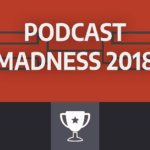Why 2019 will be the year of the podcast in higher education — and what it means for the industry

As anyone who works in higher education knows, things don’t always move very quickly. New ideas get picked apart by committees or are put on the shelf to die a slow death.
Academic interest in podcasts reflects this aversion to change. While the rest of the world caught the podcast bug a few years ago, colleges and universities have resisted the podcast trend — until now.
I predict that 2019 is the year of the podcast in higher education. Colleges and universities will come to consider podcasts as part of the platform by which they share their research and expertise with an audience outside of academia. Additionally, higher education institutions will use podcasts as a teaching tool in the classroom.
How do I know this? I was part of a team that launched a podcast at a large, land-grant university earlier this year. Since then, I’ve met with at least a half-dozen other units on campus who are interested in starting their own podcasts or are already in the process of producing one.
This is by no means a scientific study, but if my colleagues demonstrate that much interest, I’m confident that those elsewhere are similarly interested. Podcasts have proven to be anything but a flash in the pan and the academy can no longer afford to ignore their overwhelming potential.
An untapped market
There are currently more than half a million podcasts in the world, with thousands more coming online every day. At the same time, only about a quarter of the U.S. population regularly listens to podcasts, according to Edison Research.
With so many options to choose from, it’s easy for decision paralysis to set in and for would-be listeners to give up on podcasts before they ever press play. These listeners need a reason to finally figure out where the podcast app is on their phone and reduce the burden of sifting through shows to find one they like.
I believe that colleges and universities are well positioned to help people overcome this paralysis. This will increase the number of listeners, not only to shows produced at their schools, but to podcasts in general.
Schools around the world have thousands of alumni, faculty, and staff who fall squarely within the sweet spot of podcast listener demographics — educated, tech-savvy, and affluent. More, they also offer this ready-made audience the pride that comes with being affiliated with a school. This pride can translate into the desire to give podcasts a chance.
Some college presidents are already leveraging podcasts as a way to make their voices heard and talk about issues on campus, and shows like Research in Action at Oregon State have paved the way for other institutions to bring their ideas into the podcasting marketplace.
I’ve personally subscribed people to our show on their phones. I realize that this one-on-one tech support isn’t really a good marketing strategy, but it is indicative of both widespread unfamiliarity as well as curiosity and the desire to listen. All it takes is one show to open the door to the podcast world, and a podcast from a college or university can do just that.
Podcasts in the classroom
In addition to being a touch point for alumni, podcasts also have immense potential for classroom use. I’m not talking about iTunesU, but instead shows produced with an educational purpose.
Shows like Civics 101 pioneered this approach for K-12 education, but there does not seem to be the same effort in higher education. I’m not a pedagogy expert, but I do know from my own experience as an instructor using podcasts in my classroom that students enjoy listening to podcasts and reflecting on them.
And, students can listen wherever they are — whether it’s at the gym, doing laundry, or on the bus to and from campus — all of which my students reported doing. The ability to multitask while doing schoolwork is very attractive to students, who are often stretched for time as it is.
Of course, this is not to say that podcasts produced at colleges themselves are the only shows suitable for classroom use. However, faculty can design them with precisely this use in mind, creating formats, choosing topics, and developing accompanying discussion guides and other materials. This level of customization and specificity will allow for seamless integration of podcasts into the curriculum.
For their part, alumni and other audiences might find value in educational content, especially as the movement toward lifelong learning continues. Over the past decade, massive open online courses (MOOCs) have created an environment that embraces lifelong learning. The lecture portions of these courses are almost exclusively in video format. Podcasts are another way to deliver high quality educational content to a wider audience.
Podcasts allow people to stay connected with their alma maters and remain intellectually engaged long after they walk across the graduation stage. Without the pressure to directly sell a product or service, colleges and universities can focus on creating educational content that will help advance their mission and extend their outreach.
Many colleges already have recording studios or other facilities on campus and students who are eager to learn audio production and editing skills. The opportunity costs for starting a podcast are surprisingly low, but for those associated with higher ed, they are often even lower. They can allow even novice users to create a higher production value.
So, all of the tools are in place and the listeners are out there. The market has never been more primed for higher education to enter it. I can’t wait to see what my colleagues have up their sleeves in 2019.













2 Comments
Great article! I wanted to make you aware of Listenwise (https://listenwise.com) a website with curated audio stories and podcasts for middle and high school students. We are helping teachers teach with podcasts! We have a few high ed institutions using us but would love more.
Great article, and I agree that colleges and universities should embrace podcasting as a means to disseminate higher learning. I’m actually a professor of Speech-Language Pathology at the University of Akron, and I’m also a co-founder of the 3C Digital Media Network, which will launch in April. I’d love to set up a mechanism whereby colleges & universities could join our network. It would one place where these podcasts could live, and I see opportunities for marketing and sharing of other resources/expertise! Thanks again for a great article and for sparking some new ideas!
Comments are closed.